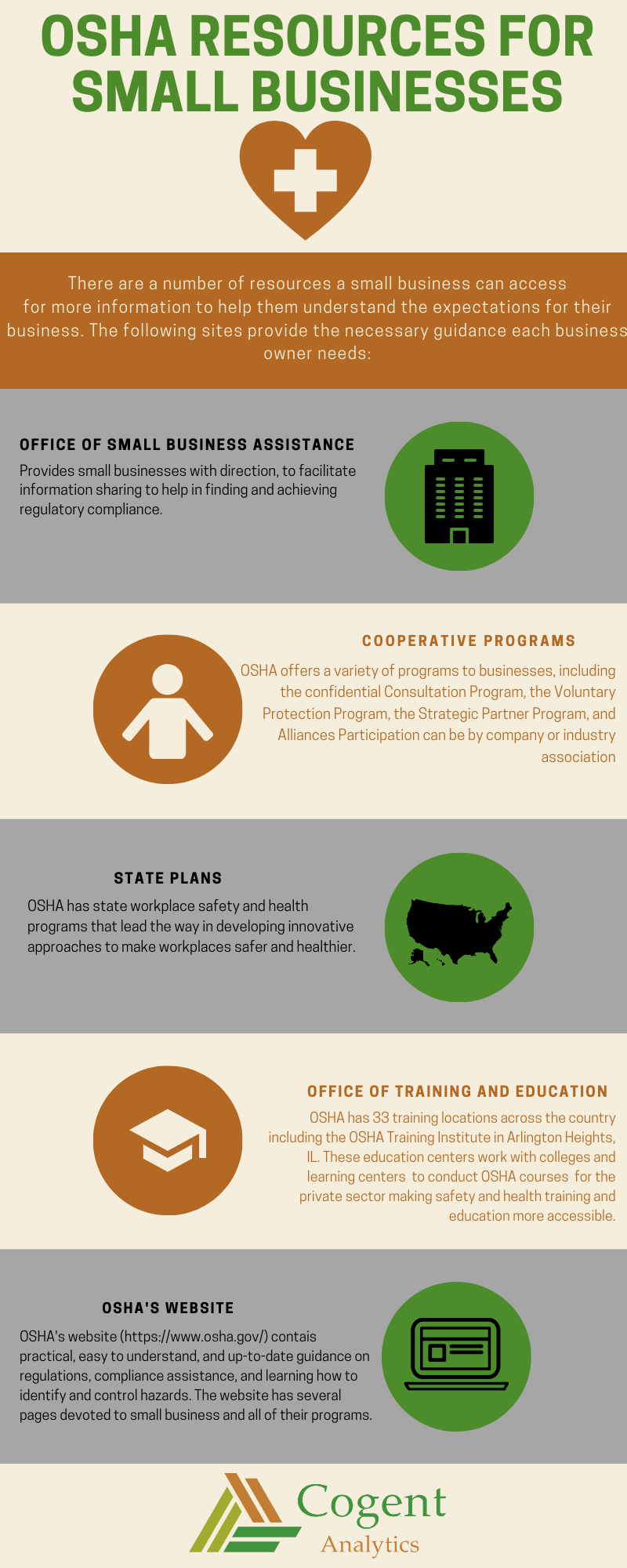The Occupational Safety Administration (OSHA) was created in 1970 when the Occupational Safety Act (OSH Act) was passed. The OSH act was passed to prevent workers from being killed or seriously harmed at work. OSHA sets and enforces workplace health and safety standards by providing information, training, and assistance to both employers and workers.
Every small business owner wants to provide a safe and secure place for its employees to work. Workplace slip and falls, accidents resulting from performing a job that requires lifting, being struck by objects or equipment, and exposure to dangerous chemicals or substances are only a few of the common workplace events that may result in employee injury. OSHA believes workplace safety is a fundamental right for every working man and woman, and they are committed to ensuring that every employer provides safe working conditions in a secure environment regardless of the type of work that is completed. For example, an employee working in a medical field may require special safety gear and training to protect themselves and others with whom they have direct contact whereas an airline baggage handler will face different workplace accidents or injuries. The business owner is charged with understanding what requirements are important for his specific industry. OSHA believes a safe work environment is central to every employee’s ability to enjoy health and security while achieving the American dream.

What does OSHA mean to the small business owner? Following OSHA requirements can mean the difference between staying in business or closing your doors. All businesses with 10 or more employees are obligated to follow all OSHA requirements, and small business owners must take care to understand the requirements for their particular industry. They must train employees to recognize compliance issues, which is best accomplished through the creation of safety groups and regular ongoing training and safety meetings. Workplace accidents and injuries sometimes have far-reaching consequences that extend beyond any financial loss due to a reduction in productivity due to time off. While every accident or unsafe work condition has the potential to impact morale, serious injuries that result in loss of life, maiming, short- and long-term disability usually result in legal action taken again the small business, regardless of whether the accident is due to the negligence of the employee or employer. These events have the potential to threaten the small business, and in some cases, put it out of business due to financial legal awards, legal costs, and bad publicity. Although accidents and injuries may occur even when the employer takes all precautions, the implementation of safety training, creation of safety committees, and a commitment of management to conduct regular safety checks at scheduled and unscheduled intervals is paramount to ensure safety. OSHA believes following their regulations protect the employees and the business.
Many small business owners who are obligated to follow OSHA regulations fail to do so because it is inconvenient for the company to be familiar with the rules for their specific industry. In truth, many business owners are surprised to discover it is far more inconvenient when they are not familiar with the rules for their specific industry when a violation is reported or a Worker’s Compensation claim is filed because profitability will be reduced. The reward for following OSHA regulations is not only a safe workplace but also the direct cost-savings to the business, which increases profitability. They include:
- Lower workers’ compensation insurance costs
- Reduction in employee medical procedures
- Smaller expenditures for return to work programs
- Lower cost for job accommodations for injured workers
- Increase in productivity
- Higher quality products or service
- Increased morale
- Better employee relations
- Reduction in turnover
- Avoiding penalties and fines for regulation violations
- Avoiding temporary closure of business until compliance for a specific violation is in place
Employees experience a benefit themselves and their families by:
- Protecting their income
- Families lives are not hindered by injury
- Their stress is not increased.
Coupled with strong, effective, and fair enforcement, OSHA strives to provide improved new outreach, education, and compliance assistance to safeguard everyone, including the small business. Protect the business you’ve worked hard to build. Take the necessary time to “safety proof” your investment. It could mean saving a life or saving your business.



